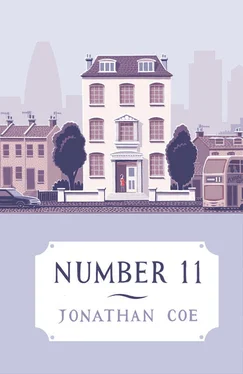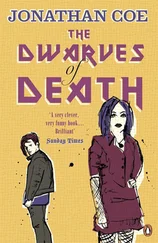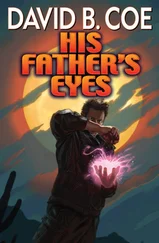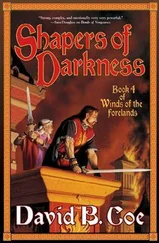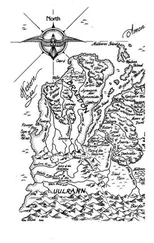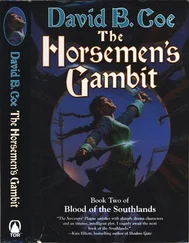Alison started to get up. ‘You can sit here if you want, Mrs —’
‘No, don’t be silly. You stay where you’re comfortable. Enjoy the sunshine. Best time of the day to sit there.’
She was perched on the edge of the sofa, clutching a mug with ‘World’s Best Gran’ written on it, a Christmas present from Rachel long years ago.
‘In the mornings, too. Always sitting there, he was, when I came down. He was waiting for the paper boy, you see.’
Alison nodded, and smiled. She didn’t know what to say.
‘That was how the day used to start,’ said Gran. ‘I’d come down. Put the kettle on. Make the tea.’
She smiled, faintly. The recollection seemed to warm her.
‘Then the paper would come. He’d get it first. I’d make some breakfast, get him his cereal. Then we’d have it in the kitchen together.
‘Then he’d go on his computer. He loved his computer. That was the best thing he ever bought. He’d do the letters, and the bills, whatever needed doing.
‘I’d stay downstairs, while he was doing that. Start the crossword.
‘Middle of the morning, we’d have another cup of tea. Together. In here. That was his chair, the one you’re in. Then I’d go out to the shops.
‘We had lunch in the kitchen. Just soup, normally. Tomato for me, mushroom for him. He’d put the radio on. Always wanted to hear the news at one o’clock.
‘Then if the weather was good, we’d go out in the garden. He was proud of the garden. We never had a gardener, never had anyone to help. Right to the end, we’d do it ourselves. Trim the borders and keep the hedge tidy.
‘Then he’d come inside for a sit-down. That chair where you are now. He always knew where to catch the sunshine.
‘I’d want to watch television later on. Quiz shows and things. He didn’t like them so much, so he’d go back upstairs, on his computer. We weren’t in the same room, but I always knew he was here, always knew he was in the house.
‘Dinner at six. We never had it much later than that. Neither of us liked fancy food. Fried mushrooms were his favourite, he’d like anything with them. Just mushrooms on toast, we’d have sometimes.
‘We never agreed what to watch on television. He liked the news, current affairs, anything political. I liked plays and comedy programmes, something to make you laugh, but they don’t make such good ones any more, do they?
‘He had a whisky at night, just before he went to bed. There was no harm in it. He only ever had the one. It helped him sleep.
‘He went to bed early. Always in bed before eleven. He’d put the radio on, not very loud. I think he just liked to listen to the voices. I’d be down here. Still trying to finish the crossword, probably. I couldn’t hear anything from upstairs, but it was enough. It was enough just to know he was there.’
She fell silent. Hunched over her mug, she wasn’t crying, but she looked frail, and tired. The afternoon sunlight fell upon her face, finding wrinkles, illuminating the folds of skin at her throat.
Alison stood up and walked over to her. She put her arms around her, felt the brittleness of her bones beneath her jumper, leaned in, saw the whiteness of her scalp through the thinning, frost-coloured hair. She kissed the top of her head, a gentle, lingering kiss.
‘Rachel was calling for you,’ Gran said. ‘I think she needs your help.’
*
Rachel was sitting at the top of the plum tree, her face tilted towards the sun, enjoying the warmth of its rays upon her face. She loved sitting amidst the branches of this tree — had loved it ever since she was a child — with its view over the neighbouring gardens, the tidy patchwork of suburban life laid out beneath her, and in the distance, the monumental, greyish-cream towers of the Minster.
She looked down when Alison approached and said:
‘About time too. Where’ve you been?’
‘Chatting to your gran. Are you all right up there?’
‘Very comfortable actually.’
‘You’re not supposed to exert yourself.’
‘I’m fine. I’ve been fine for ages. I wish everybody’d stop worrying about me.’
And it was true. Rachel was looking healthier than she had looked for many weeks. She’d been living at home with her mother in the months since her discharge, and she was rested, and she was happy again. She had put it all behind her.
‘Come on, then,’ said Alison. ‘Those plums aren’t going to pick themselves. Chuck them down and I’ll catch them in the basket.’
‘Right you are.’
Rachel reached across to the furthest bunch. There had been another wonderful crop this year. They were purple and luscious, perfectly ripe, with soft powdery skins.
As she plucked the first one, a spider ran out from beneath it. She held out her arm, and allowed it to scuttle along the pale skin of her underarm until it had reached the neighbouring branch, where it ran off to safety. Rachel watched it disappear between the cracks in the bark. Then she threw the plum down to Alison.
‘Here, catch!’
They continued like this, throwing and catching, throwing and catching, for a minute or two, until Alison stopped and said:
‘Do you miss Jamie, Rache?’
‘A bit.’ She threw down another plum. ‘What about you, do you miss Selena?’
‘A bit.’
‘Well, if you ask me,’ said Rachel, ‘we’re better off single.’
‘Too right,’ said Alison. ‘You know what, though?’ she added, a thought having just occurred to her. ‘Perhaps we should be a couple.’
‘You and me?’ Rachel laughed dismissively. ‘Dream on,’ she said. ‘This lady’s not for turning.’
‘Suit yourself,’ said Alison. ‘I don’t fancy you anyway.’
Rachel laughed again, and plucked one more plum from a bunch of four. She took the fruit, rubbed it clean against her T-shirt and bit into it. The juice was deliciously sweet in her mouth. It was the taste of her childhood; the taste of home; the taste of autumn sunshine.
My name is Livia and I come from Bucharest. I have been living in London for more than five years, and my job is taking the dogs of very rich people for their daily walk.
But that is not all.
Strange things have happened in this part of London. Six people disappeared, and they have never been found. The police keep making enquiries, looking for connections. They came to interview me. But the real connection between these six people is something that they have never noticed.
They all had dogs.
I am Livia, and I come from Bucharest. I have lived in London for five years, and I know not just its streets, but also its secret places, above ground and below. None of these places is deeper, or more secret, than the place beneath the tall house in Turngreet Road, eleven floors beneath the ground, beneath the wine cellar and the vault and the swimming pool where the palm trees grow.
There is a tunnel. And beyond the tunnel there is a room. And there they hang, in the dark. Each one wrapped in a cocoon of silver threads. Watched over by the vengeful creature with the amber eyes.
My vengeance takes many forms. My body takes many forms.
We have a saying in my country, by the way: Dupǎ faptǎ şi rǎsplatǎ . Which means, measure for measure, or the biter bit.
If you understand the saying, you will understand my nature. I am not merciful. I am not just. I cannot be tamed. I attack whomever I want, and whatever I want.
I am not angry. I am anger itself.
You may feel pity for my victims. That is your choice. You may place your sympathies with them, or with me. That is your decision.
In the end, I believe, we are all free to choose.
The section of this book entitled ‘The Crystal Garden’ was inspired by the piece of that name by Harold Budd, recorded on his album The Pavilion of Dreams (OBS 10) in 1978.
Читать дальше
